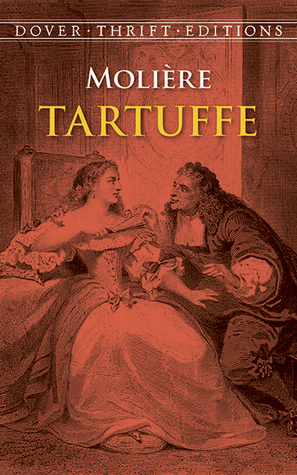Jean –Baptiste Poquelin popularly known as Moliere was a famous comic playwright in France during the seventeenth century. Jean’s father was a court upholster so he had the best education and was even offered his father’s job. But he refused it and started writing plays. Very early in life he and the people around him discovered that he had a flair for mimicry and satire. He wanted to hone that skill and entered into writing comical satires. He changed his name to Moliere to avoid embarrassment to his clan, for they did not want an actor amidst them.
The Impostor
Moliere wrote many plays but they were banned for various reasons. Then he left Paris, toured the countryside popularizing his plays. He then came back to Paris and staged it in front of the king and was rewarded well by the king. The nobles in the court and the church did not like his plays and he was even written off from the church. Tartuffe which means impostor in French is an excellent play. It has been adapted to films, televisions and opera. Many films have taken inspiration from this play. The obsession of the protagonist with a so-called holy man forms the theme of the play.
Orgon, a middle class French man meets a pious man called Tartuffe in the church and brings him over and allows him to stay in his house as long as he wants. His mother Madame Pernelle is also in awe of this man who feigns humility and piety. All the others in the household, Elmire, wife of Orgon, their children, Elmire’s brother and the maid in the house know for certain that Tartuffe is an impostor and tries ways and means to put sense into Orgon but in vain. Tartuffe is infatuated by the young and beautiful second wife of Orgon, Elmire and everyone is aware of it.
The Obsession
After being away on a trip, Orgon arrives and asks about Tartuffe, the first thing. His wife has not been keeping well but all that does not bother him; he only wants to know about Tartuffe. He also wants his daughter Mariane to marry Tartuffe even though she was in love with Valere. When Cleante, Elmire’s brother asks about conducting the marriage of Mariane and Valere, Orogon avoids him and we soon realize he has other plans in mind. It finally comes out when the witty Doraine, the maid questions this. On her part, Mariane cannot go against her father’s wishes and the shameless Tartuffe agrees to marry the young girl because he realizes he will come into a lot of wealth by marrying her.
Now all in the house hatch a plan to expose Tartuffe but before that they had to be sure of his cheap intentions. Damis, Orgon’s son hides in the closet to keep a watch on Tartuffe’s advances towards his step mother Elmire. When Tartuffe finds Elmire alone in the room he makes his love and lust for her, open. She threatens to reveal his true nature to Orgon. She tells him if he walks out of the marriage with Mariane she might reconsider and not tell Orgon what happened between them. But he is not bothered because he knows for certain Orgon will not believe her words.
The Court Order
Unable to withstand more Damis jumps out of the closet threatening to reveal his sinister nature. But they are mistaken, for when it is revealed Orgon believes Tartuffe and disinherits his own son. He writes all the properly in the name of Tartuffe. It is with a lot of persuasion from Cleante, Elmire’s brother that he agrees to hide and watch Tartuffe advances towards his wife. When Orgon actually sees Tartuffe’s interest in his wife, he is enraged and shouts at Tartuffe. But it is too late. Tartuffe has inherited the property and had in his possession some secret documents of Orgon. He sends an eviction order to Orgon and Damis sets out to kill Tartuffe. It is Cleante who stops this. Cleante is the level headed person who tries to bring in good sense into all.
Before long, Tartuffe arrives with soldiers to arrest Orgon for helping a criminal. Tartuffe had turned in the secret documents to the king and persuaded the king to arrest Tartuffe. With that arrest he knew he would get the property and Elmire. But there is a sudden turn of events. The soldiers who arrive to arrest Orgon arrest Tartuffe because his unscrupulous ways are seen by the king and they also realize he is criminal. Tartuffe is arrested, Orgon is let free in spite of mistake he committed and all his property comes back to him. The marriage between Mariane and Valere is quickly arranged. The story ends on a happy note.
Criticisms
Tartuffe after whom the novel is named is a priest with the most pious look and is humility personified. He does not appear on stage till about the end of first act. The words describing him are in stark contrast to what actually happens on stage between him and Elmire. When his actions are reported he only takes the blame himself and even offers to leave the house. All this enrages Orgon and send his own son from the house to keep peace with Tartuffe. Such was the stupidity of Orgon.
A priest being shown as a liar, lecher, scoundrel and a criminal did not go down well with the church and nobility being shown as pig-headed was disliked by the nobles. So from both the sides there were attacks on Moliere but since he had the king’s patronage he managed to stage the shows. He had to redo the play many times yet the dialogues of Doraine and the stupid reactions of Orgon make the play a hilarious one. The last scene where the game is over for Tartuffe is also unexpected and the solemn track the play takes suddenly becomes light again. In spite of the harsh criticisms Moliere’s work withstood the travails of time and is still an inspiration for many a play or film.







